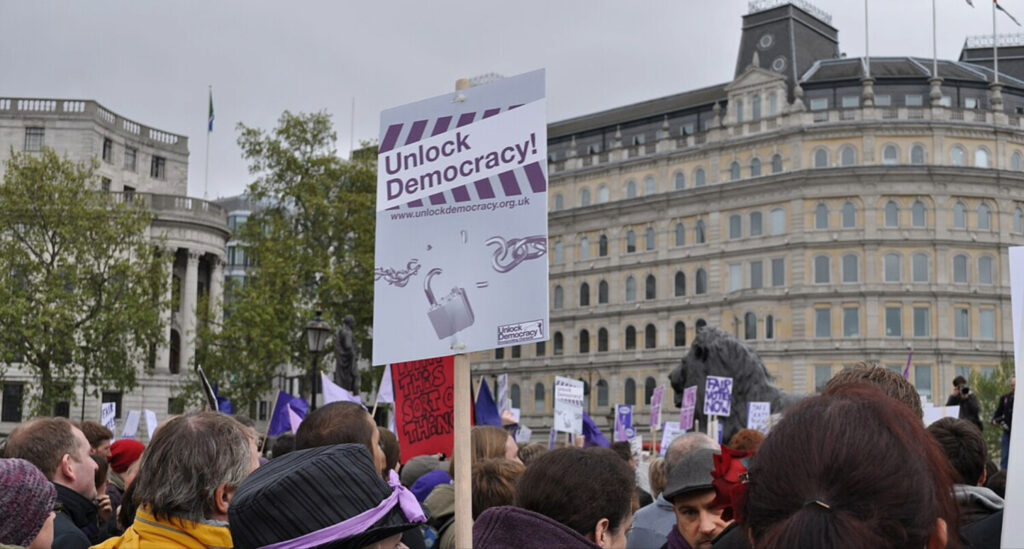Is British Democracy Still Representing its Citizens? Declining Participation and Options for Renewal
The question of political representation has long divided scholars of British democracy. Over the past seven decades, the political landscape has shifted markedly, from the programmatic and charismatic leadership of Clement Attlee to the personality-driven politics of Boris Johnson, and the following Prime Ministers: Truss, Sunak and Starmer. Alongside these transformations, new challenges have emerged: a decrease in turnout or an increase in apolitical citizens that consider themselves issue-based voters. This essay will break down the factors central to ensuring democracy is representative such as a focus on direct democratic methods but will equally aim to explain why issues like a decreased turnout in recent years have dwindled the extent of representation in British democracy.
British representative democracy in recent decades has been dealt critical blows by the continued decrease in turnout, “in the 1970 election, for instance, turnout in Britain ranged from 44.9% in Stepney to 85.3% in Cornwall North” (Denver, 1974) and this highlights a pattern in the extent of representation in Britain, Cornwall in the 1970s were at a peak in the call for Cornish independence. Therefore citizens voted based on their issues and the importance it had to them. Such cases illustrate a broader trend: the issue based voting that began appearing in England undermined representation as people only voted when issues important to them were raised and this is as Tormey observed: “when voters perceive there is something important at stake, they will vote; if not, then they will stay away” (Tormey, 2015). Simply: issue-based voting, while politically understandable, undermines the universality of representation by narrowing participation to moments of immediate relevance.
This dynamic has been perfectly exemplified in elections where parties mobilised voters by offering highly salient policies. The 2017 general election engaged voters to an extent not seen for the last twenty years, seeing turnout rise to 69%, the highest since 1997 (Heath, 2017). Much of this surge came from young voters energised by the Labour party who greatly increased turnout among 18-24 years of age with promises of cutting of university tuition fees, alongside the the Conservative promises to deliver Brexit. Yet the wider picture remains troubling: sustained declines in turnout weaken the foundations of representative democracy. If participation is uneven or conditional, elected officials represent only subsets of the electorate rather than the national community as a whole. As Heath noted, “the UK, along with other European countries, displays a more worrying trend in that turnout looks to have entered a pattern of decline from the 1960s” (2017). Declining participation thus signals not only domestic democratic fragility but also a Europe-wide erosion of representative legitimacy.
A central question therefore arises: how can representation be revitalised? Britain appears caught in a cycle of declining turnout and diminishing legitimacy, suggesting that new approaches are required. In the words of Saward, “we do not need more models of democracy, but we do need a fresh view of democratic theory to take full advantage of deliberative, ecological, cosmopolitan, and other innovations of recent years. Approaches such as these can be understood in terms of the devices they deploy- deliberative forums and cross-border referendums, for example, as well as more familiar elections and legislatures” (Saward, 2003). In the UK, referendums have proven particularly effective at mobilising participation: The 2016 referendum for example witnessed a 72.2% turnout portraying increased participation because citizens were able to express their wish for leaving or remaining in the European Union. This is significant because the increased use of direct democratic methods correlates with an increase in voter turnout, equally the use of referendums ensures that representatives listen to the people and act upon their requests. This has been an issue increasingly raised for debate: the idea that representatives have excessive autonomy and therefore scholars arguing for representation in British democracy often express that those representatives prioritise on using their power to represent vested interests and therefore the extent of representation in the British political landscape is minimal.
Referendums, in theory, should function as instruments of deliberative democracy, enabling collective decision making that reflects the will of the majority: “one common-sense notion of fairness is that group decisions should reflect the preferences of the majority of the group members” (Clark, 2019), of which under British representative democracy, has not happened to the necessary extent. Yet, there is an underlying issue in the way referendums are used. While they can broaden participation, they are also vulnerable to manipulation by political elites. For instance, the focus of the 2016 referendum was one of party politics with one of the reasons for the calling of the referendum being to ensure that divisions in David Cameron’s party were solved especially since those divisions highlighted the overarching idea that “political parties and elites have suffered from a rapid loss of trust concerning both their willingness and ability to respond to nonelites and to promote kinds of social and economic change” (Offe, 2017).
It is therefore evident that deliberative mechanisms such as referendums do not automatically enhance representation. Their impact depends on the motivation of political actors who design and implement them. Brexit raises the critical question: was the 2016 referendum truly representative, or was it primarily a compromise shaped by political constraints: “it is common to consider representative democracy a compromise due to political restraints” (Floridi, 2016). Nevertheless, the increased use of referendums in the UK has undeniably mobilised citizens who might otherwise abstain. Knowing that their vote has a direct impact on a specific outcome, more are inclined to participate. Other deliberative mechanisms, for example, citizen’s juries and the way they encourage active deliberation in a common non-politically hostile way have demonstrated that democracy is still representative, however to a minor extent that is still heavily challenged by this non-representative political landscape.
Another issue to representation in Britain lies in the rise of issue-based voting. There has been a crucial decline in the extent of British representative democracy as a result. Voting has gradually become more issue-based, particularly with younger generations who feel that in general they have not been represented, hence they almost solely vote on important issues and typically less in general elections. For example, “turnout in the 2001 UK General Election sunk to a post-war low of just 59%. It is clear that at this election, even fewer young, first-time voters participated” (Kimberlee, 2010). The consequences are profound: if younger generations abstain from routine electoral participation, they allow governments to be elected on the basis of a minority of the population, narrowing the scope of representation. This has hindered representation, and the Brexit referendum underscored this tension: turnout was disproportionately driven by those who wanted to leave, while many younger citizens abstained, reinforcing the sense that outcomes were shaped by the preferences of those most mobilised rather than by society as a whole.
Yet this account should be nuanced. Evidence suggests that younger people are not wholly disengaged but seek representation through alternate democratic methods as found by Anne Powell. Young people vote more online, a study analysed the intent to use the online voting system and “using the unified theory of acceptance and use of technology (UTAUT), the study found that performance expectancy, effort expectancy, social influence, trust in the internet and computer anxiety were significantly related to the intent to use online voting. Trust in the government was insignificant” (Powell, 2012). Representative democracy was still overall largely visible however it appeared in a less ordinary method of representation, it tackled the main issue with representative democracy and in-person voting which lies in the idea that “representation is an issue because politicians have goals, interests and values of their own” (Przeworski, 1999).
In conclusion, representative democracy in Britain is not and has not been largely present to a sufficient extent and it has been dwindled largely through the means in which British politicians have engaged with their constituents. There has been a visible, gradual change through the increasing use of deliberative democratic methods and equally the way youths have adapted their voting methods to allow them to vote in a way that suits them. Still, these innovations are not sufficient on their own. For Britain’s democracy to become more genuinely representative, structural reforms in the relationship between constituents and their representatives are necessary, ensuring that the diversity of public preferences is reflected in political decision-making. Representation in Britain is not dead, but it is contested, and it will require sustained reform to be revitalised.



